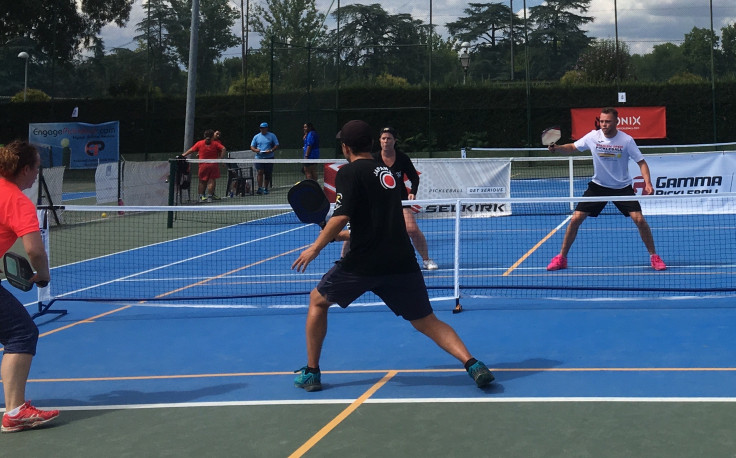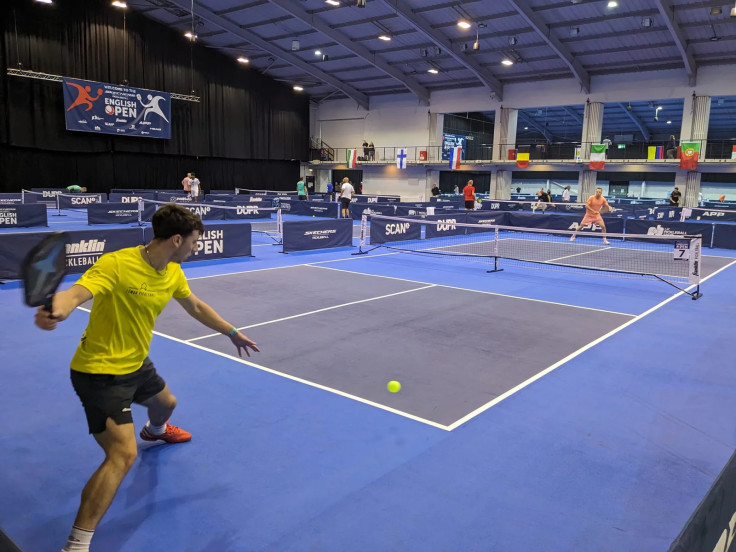Pickleball: The New Sport Taking Britain by Storm
The number of clubs in the UK has doubled to almost 400 in just two years and there are now more than 12,000 registered players all over the country.

Imagine a sport that combines tennis, badminton and table tennis. You can play it anywhere — outside, inside, in your garden, on the street. All you need is a small net and two paddle bats.
Well, that sport has a name. Pickleball, already played by over 36 million people in America, is described as easy to learn and hard to master, which makes it appealing to all ages and ability levels.
The game was created in 1965 on Bainbridge Island, Washington, at the summer home of Joel Pritchard, who later served in the United States Congress and as Washington's lieutenant governor.
Pritchard and two of his friends, Barney McCallum and Bill Bell settled on "Pickleball" – a reference to the thrown-together leftover non-starters in the "pickle boat" of crew races, not because the family dog of one of those dads on Bainbridge Island was called Pickles (a common misconception)
Over 50 years later, the sport has become immensely popular in parts of the US.
The tournament is overseen by the U.S.A Pickleball Association; itself reincorporated with an updated rule book in 2005 after its foundation in 1984.
As of 2022, there are over 8000 pickleball locations in the United States.
NBA player LeBron James, retired NFL quarterback Drew Brees, and entrepreneur Gary Vaynerchuk have all made investments in professional pickleball teams, spreading exposure to the sport.
And it seems entirely possible it won't be long before 'pickleball fever' spreads across Britain too.
Lemon Pickleball, a new company based in North London, is aiming to capitalize on the sport's recent surge in popularity.
They're offering sessions for all ages and abilities, and have experienced an immediate uptick since they began operating in August.
Beginning with just one site — in East Finchley — they now offer sessions at six locations around London, as well as corporate packages for events like stag and hen do's.
I spoke to Ash Spencer, one of its founders, who tells me that he was inspired to start the business after noticing a lack of provision for pickleball in London.
"Before the pandemic as a touring musician, I had always loved playing racket sports in my downtime to keep physically and mentally fit. Whenever I returned home to London it was always so difficult to find somewhere to play pickleball without travelling across the city."
"A few months ago, my business partner, Alex, who's also a fantastic tennis coach and I, decided to throw ourselves into pickleball as we wanted to give more people the chance to discover this wonderfully fun and inclusive sport."
But starting a company from scratch, in a relatively unknown market, is far from easy.
Data from the BLS shows that approximately 20 per cent of new businesses fail during the first two years of being open, 45 per cent during the first five years, and six per cent during the first 10 years. Only 25 per cent of new businesses make it to 15 years or more.
Ash explains how finding available indoor spaces that are suitable for pickleball is the biggest challenge his business currently faces.
"We are predominantly currently limited to using school sports halls which are rarely available before 6 p.m.," he said.

With no permanent premises, Lemon Pickleball is renting out sports halls across the city to run their group sessions.
But a major advantage of the sport is its portability — in one bag you can carry the net, padel racquets, and balls. And that's all you need to start playing. This enables Ash's company to set up shop wherever there's a demand.
And it appears there is quite a demand.
The number of clubs in the UK has doubled to almost 400 in just two years and there are now more than 12,000 registered players all over the country - mostly amateurs, aged between 18 and 85, a thousand of whom took part in the English Open in Shropshire in August.
But will this initial flurry lead to an established spot for Pickleball amongst the UK's most popular sports?
People in England have an immense passion for their favourite teams and players, whether that's in football, rugby, cricket or tennis.
The UK has a sophisticated sporting calendar, allowing residents to enjoy different sports throughout the year.
Over 25 million people, or 40 per cent of the UK population, watch football.
Football clubs are also an integral part of UK culture. These clubs are symbols for local communities, and they also have a deep-rooted connection with fans throughout Britain.
Cricket is considered by some to be England's truly national game, and it is the second most popular sport in the UK.
Around 18 per cent of the UK population watch live cricket matches in stadiums and on TV, with 2 per cent participating in this most traditional of sports.
Pickleball's older brother, Tennis, has experienced a recent resurgence.
The number of adults reporting that they had played tennis during the year increased by 43 per cent compared to the previous year, rising from 3.3 million to 4.7 million from January through to December.
This is the highest total recorded since 2017 and has continued the growth seen in 2018-19 which was interrupted during the pandemic.
In addition, more than two million adults play monthly, the highest level recorded since the Lawn Tennis Association started tracking this measure seven years ago.
And Pickleball wouldn't be the first challenger to try and threaten the dominance of the UK's traditional sporting hierarchy.
Padel tennis, an intriguing spin-off to its father sport involving a glass cage and perforated bat, has over 3.5 million players in Spain, home to more than 14,000 courts.
An article in The Times last year described it as "the future of tennis for the masses".
But despite rave reviews and endorsements from Andy Murray, Jurgen Klopp and Pep Guardiola, the sport is yet to lure a significant number of former tennis players to its transparent glass playground.
So what makes Pickleball different?
Well, unlike Padel, you can set up a court anywhere, outdoors or indoors. All you need is a net, two bats and a ball. This makes the possibility for rapid expansion of the sport much more realistic.
And Ash tells me he and his business partner are currently overwhelmed by the demand for sessions.
"Once people play once, they almost always come back, eager to learn more and improve," he says.
So — easily accessible, surging popularity — but how do you actually play?
Players use a solid paddle to tap a perforated plastic ball over a low net, strung across an area just under a third the size of a tennis court. Serving is underarm. You're not allowed to volley within 7ft of the net — this zone is known as the kitchen. The most common shot is the drop shot or dink.
Other than the scoring — which borrows from badminton and ping-pong — that's about it for the basics. It's neither as technically demanding as tennis, nor as physical as squash or padel (and unlike the last two, there are no bouncing balls off the walls).
Matches are generally doubles, so no demanding running around, and most clubs adapt badminton or tennis courts in leisure centres, to guard against the changeable weather.
As a keen tennis player, I decided to give it a go myself.
One freezing cold September evening, I spontaneously booked a spot in a beginner's group session, run by Lemon Pickleball, and turned up.
I was pleasantly surprised at how much easier pickleball was to pick up. Within the first 20 minutes, I was already having long rallies with my fellow players and by the end of the session, I felt like I'd been playing for years.
I was also shattered by the end — don't let the small court and friendly nature of the sport deceive you. It is tiring, in a good way, and excellent physical exercise.
I can safely say I'm sold.
After speaking to several attendees of the evening session I attended, one benefit of the sport is repeated by them all. It's really good for you.
Although it's easier on the body than tennis, researchers have found benefits for hand-eye coordination, muscle strength and mobility.
A 2018 study from Western Colorado University found that playing pickleball three days a week could increase cardiorespiratory fitness by 12 per cent, reduce blood pressure by 3.5 per cent and raise good cholesterol by five per cent.
According to the Lawn Tennis Association, a 30-minute game of pickleball can burn up to 300 calories, while players with Parkinson's disease credit it with helping them maintain coordination, balance and agility.
The physical benefits will certainly help its appeal, and sociologist and cultural critic Ellis Cashmore says as long as there's a demand, there's no reason why the sport won't rapidly grow in status.
"I'm old enough to remember how there was a surge of enthusiasm for squash and, almost overnight, squash courts appeared across the UK. Pickleball can also be played indoors, which is a plus point in a country like Britain!"
Cashmore adds that as a participation sport, there aren't many obstacles to Pickleball's growth.
"FiveASide is an obvious example of a variation of an established sport which has surged in popularity and held its own."
So, what is next for Pickleball?
The Olympics? Maybe. Thanks to this same popularity surging in the US, many players are hopeful it will get added by 2030.
However, Cashmore suggests Pickleball's problem will arrive when it wants to be taken seriously as a sport.
According to Cashmore: "Although The International Olympic Committee is quite open to new sports, like Breaking and Skateboarding, it might take a while for them to entertain the idea of introducing pickleball into its program."
There is no doubt that to expand the popularity of pickleball, the International Federation of Pickleball must take steps towards its Olympic goals.
It's important not to get ahead of ourselves. Pickleball will never dissolve the appeal of tennis, or dislodge the cultural hold of football in this country.
Indeed, it is not a thrilling sport to watch, and you'd be forgiven for finding the repetitive nature of rallies and points a little tedious.
But Pickleball does have a market. Those looking for something a little different to the traditional racket offerings which don't appeal to everyone.
More accessible, easier to pick up, and sociable, Pickleball definitely has a lot going for it.
Ash, the founder of Lemon Pickleball, has big plans for the future. He said: "We're looking to build permanent premises in 2024. This will allow us to run sessions, coaching, and tournaments throughout the day rather than just being limited to evenings."
"This will also allow us the opportunity to put on more corporate events, tournaments, after-school clubs and parties without having to search around for suitable locations," Ash concluded.
It is certainly an enticing proposition. If you're looking for a new sport to try, Pickleball should be high up on your list.
© Copyright IBTimes 2025. All rights reserved.





















